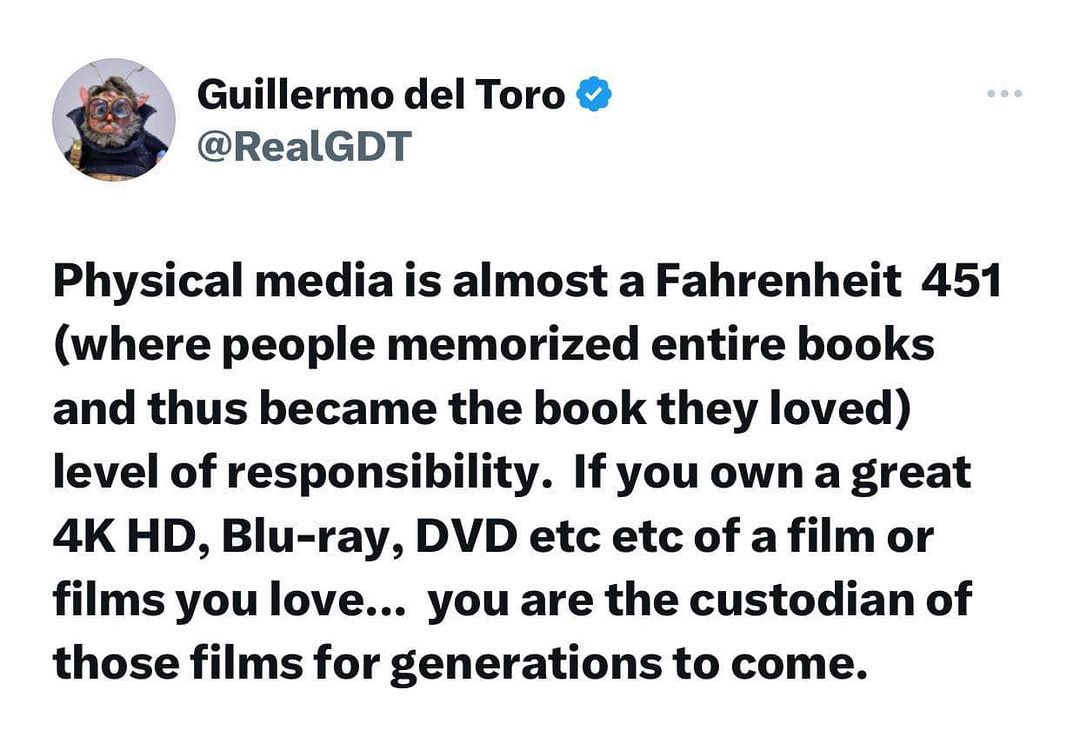this post was submitted on 21 Nov 2023
216 points (96.2% liked)
Home Video (VHS, DVD, Blu-ray, 4k)
694 readers
1 users here now
On Reddit we have r/dvdcollection, r/boutiquebluray, r/4kbluray, r/steelbook, r/vhs, etc but let's start simply with a community to cover all the forms of home video collecting.
So, do you feel nostalgic for a format? Are you looking forward to a release? Heard any exciting news? Want to show us your shelves? Then post away.
Elsewhere on the Fediverse:
- !bluray@compuverse.uk
- !boutiquebluray@lemmy.world
- !criterion@lemmy.world
- !laserdisc@lemmy.sdf.org
- !cultfilms@lemux.minnix.dev
- !categoryiii@lemmy.world
- !cinemajoy@lemmy.world
- !movies@lemm.ee
- !movies@lemmy.world
- !movies@lemmy.ml
- !movies@kbin.social
Chat:
Rules:
- Be excellent to each other
founded 1 year ago
MODERATORS
you are viewing a single comment's thread
view the rest of the comments
view the rest of the comments


Well, maybe not DVD given the shelf life, but certainly Blu-ray and Ultra HD.
Blu-ray has about the same storage life as a DVD.
Millennium discs are a thing, though, where the data is burned into plastic rather than a film.
Actually, Blu-ray should have an obscenely long shelf life. If I understand correctly, it doesn't use an organic layer for holding data and is a lot like an M-Disc in terms of lifespan.
Both of you are using very confusing terms. Physical disks are stamped plastic. The 0's and 1's are physically in the plastic as pits and lands.
The problems with earlier disks and bad production run disks are that reflective backing oxidizes. But the physical data is still stamped into the disk.
Bluray changed out the aluminium reflective layer for a silver alloy so it's more resistive there.
I don't know where you got organic from or the other guy, film?
I'd probably start with this which describes the m-disc, which is made for longterm cold storage. If you check out the wiki for bluray it talks about how some forms use organic methods of writing. Check out Types > Bluray Disc recordable section:
In any case, optical discs are not really "stamped" it is generally burned using a type of laser, and usually on to an organic dye, though that is what the posters your replying to are talking about:
edit: also worth mentioning – my favorite podcast the Accidental Tech Podcast (which, be forewarned is Apple-centric) released an ep not too long ago discussing this. It's part of their post-show on this ep and they use chapter markers, so you can skip basically right to it if you have a half decent podcast player. It's not intended as an explainer video or anything, but having not thought about optical discs in quite a while it does serve as a half decent refresher.
No, optical disks are indeed stamped. You are talking about recordable disks. Which are different thing entirely.
oh, gotcha. I think once someone started talking about m-disc I basically defaulted to thinking about recordable discs.
So, I might have gotten this wrong, but it was my understanding that CDs and DVDs (at least the writable kind) use an organic (carbon-based) layer for data storage, which is why CDs and DVDs succumb to disc rot over time. Blu-ray, however, shouldn't have that issue because they don't use an organic layer. I might have misunderstood that though.
Writable cds and dvds use a bunch of different technologies, but they are an aside to the conversation here.
Disk rot when it's used is generally always used when talking about pressed disks not writable disks. Dvds, cds and blurays all use variations on the same technology which is stamped plastic with a reflective layer at the back made out of a metal. No organics.
Thanks! I didn't know that, I assumed normal discs were just pre-written [disc]-R with special printing on the label.
Does that mean pressed discs can be potentially fixed by carefully peeling off the metallic layer and applying a new one?